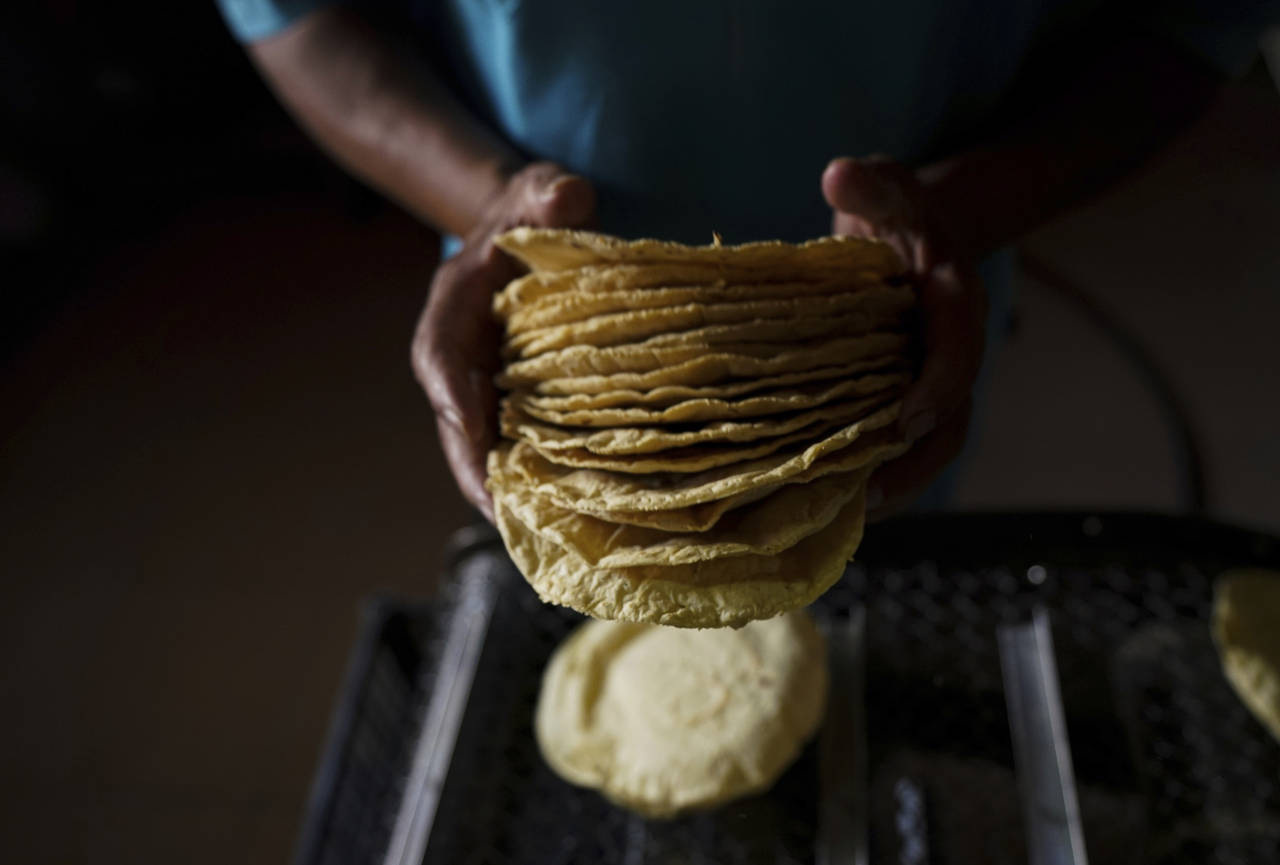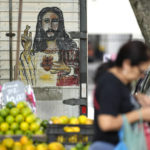Pricey tortillas: LatAm’s poor struggle to afford staples
May 13, 2022, 12:00 AM | Updated: 12:07 pm

A worker packages tortillas to sell for 20 Mexican Pesos per kilogram, about one dollar, at a tortilla factory in Mexico City, Monday, May 9, 2022. Almost a year ago the same tortilla factory used to sell a kilo of tortillas for 10 Mexican Pesos. (AP Photo/Fernando Llano)
(AP Photo/Fernando Llano)
MEXICO CITY (AP) — No item is more essential to Mexican dinner tables than the corn tortilla. But the burst of inflation that is engulfing Latin America and the rest of the world means that people like Alicia García, a cleaner at a restaurant in Mexico City, have had to cut back.
Months ago, García, 67, would buy a stack of tortillas weighing several kilograms to take home to her family every day. Now, her salary doesn’t go so far, and she’s limiting herself to just one kilogram (2.2 pounds).
“Everything has gone up here,” she told The Associated Press while standing outside a tortilla shop. “How am I, earning minimum wage, supposed to afford it?”
Just as inflation isn’t limited to tortillas, whose prices in the capital have soared by one-third in the past year, Mexico is hardly alone. Latin America’s sharpest price spike in a generation has left many widely consumed local products suddenly hard to attain. Ordinary people are reckoning with day-to-day life that has become a more painful struggle, without any relief in sight.
Countries had already been absorbing higher prices because of supply chain bottlenecks related to the COVID-19 pandemic and government stimulus programs. Then Russia’s invasion of Ukraine in late February sent fertilizer prices sharply higher, affecting the cost of agricultural products including corn. Global fuel prices jumped, too, making items transported by truck to cities from the countryside costlier.
In Chile, annual inflation was 10.5% in April, the first time in 28 years the index has hit double digits. Colombia’s rate reached 9.2%, its highest level in more than two decades. In Argentina, whose consumers have coped with double-digit inflation for years, price increases reach 58%, the most in three decades.
In beef-crazy Buenos Aires, some households have started seeking alternatives to that staple.
“We never bought pork before; now, we buy it weekly and use it to make stew,” Marcelo Gandulfo, a 56-year-old private security guard, said after leaving a butcher’s shop in the middle-class neighborhood of Almagro. “It’s quite a bit cheaper, so it makes a difference.”
Last year, the average Argentine consumed less than 50 kilograms of beef for the first time since annual data were first collected in 1958, according to the Argentine Beef Promotion Institute. Over the past few months, prices have been “increasing a lot more than normal,” said Daniel Candia, a 36-year-old butcher.
“I’ve been in this business for 16 years, and this is the first time I’ve seen anything like this,” he said.
Latin America as a whole is suffering from “sudden price spikes for necessities,” the World Bank’s President David Malpass said during an online conference Thursday. He noted that energy, food and fertilizer prices are rising at a pace unseen in many years.
Across the world, central banks are raising interest rates to try to slow inflation. Brazil’s central bank has undertaken one of the world’s most aggressive rate-raising cycles as inflation has topped 12% — its fastest pace since 2003. Besides the factors that are stoking regional inflation, Brazil’s agricultural products have become costlier because of drought and frost. The price of tomatoes, for example, has more than doubled in the past year.
Higher rates are a government’s primary tool to fight high inflation. But jacking up rates carries the risk of weakening an economy so much as to cause a recession. Last year, the World Bank estimated that the region’s economy grew 6.9% as it rebounded from the pandemic recession. This year, Malpass said, it’s projected to grow only 2.3%.
“That’s not enough to make progress on poverty reduction or social discontent,” he added.
Brazilian newspapers are telling their readers which foods they can substitute for their usual products to help stretch family budgets further. But some items, like coffee, are irreplaceable — especially in the nation that produces more of it than any other in the world.
Ground coffee has become so expensive that shoplifters have started focusing their sights on it, said Leticia Batista, a cashier at a Sao Paulo supermarket.
“It breaks my heart, but I told many of them to give the powder back,” Batista said in the upscale neighborhood of Pinheiros.
In her own humbler neighborhood, she said, the cost of coffee “is a big problem.”
On the more upscale end of the java spectrum, Marcelo Ferrara, a 57-year-old engineer, used to enjoy a daily espresso at his local bakery. Its cost has shot up 33% since January, to 8 reais ($1.60). So he’s cut his intake to two each week.
“I just can’t afford too many of these,” Ferrara said as he gulped one down.
It has been decades since the region’s countries simultaneously suffered soaring inflation. A key difference now is that the global economies are much more interconnected, said Alberto Ramos, head of Latin America macroeconomic research at Goldman Sachs.
“Interest rates will need to go up; otherwise, inflation will run wild and the problem will get even worse,” Ramos said. “Governments cannot be afraid of using rates. It is a proven medicine to bring inflation down.”
So far, though, higher rates aren’t providing much hope that inflation will decline significantly in the near term. The International Monetary Fund last month projected that average inflation in the region, excluding Venezuela, will slow to 10% by year end. That’s not much below the 11.6% rate registered at end-2021 and still more than twice the 4.4% expected for advanced economies, according to the IMF’s World Economic Outlook.
“It will take at least a couple of years of relatively tight monetary policy to deal with this,” Ramos said.
That means belt-tightening and going without some consumer staples, for now, is likely the new norm for the poorest members of society in the notoriously unequal region. More than one-quarter of Latin America’s population lives in poverty — defined as living on less than $5.50 a day — and that’s expected to remain unchanged this year, according to a World Bank study published last month.
Sara Fragosa, a 63-year-old homemaker in Mexico City, didn’t hide her anger at rising prices during an interview at one market’s stall.
“Those who are the poorest are the worst off, while the rich only rise,” said Fragosa, who said she has replaced her regular beef purchases with quinoa and oats.
“You’re not used to it,” she said, “but you don’t have a choice.”
___
AP reporters Savarese reported from Sao Paulo and Politi from Buenos Aires
Copyright © The Associated Press. All rights reserved. This material may not be published, broadcast, rewritten or redistributed.





















